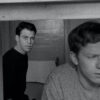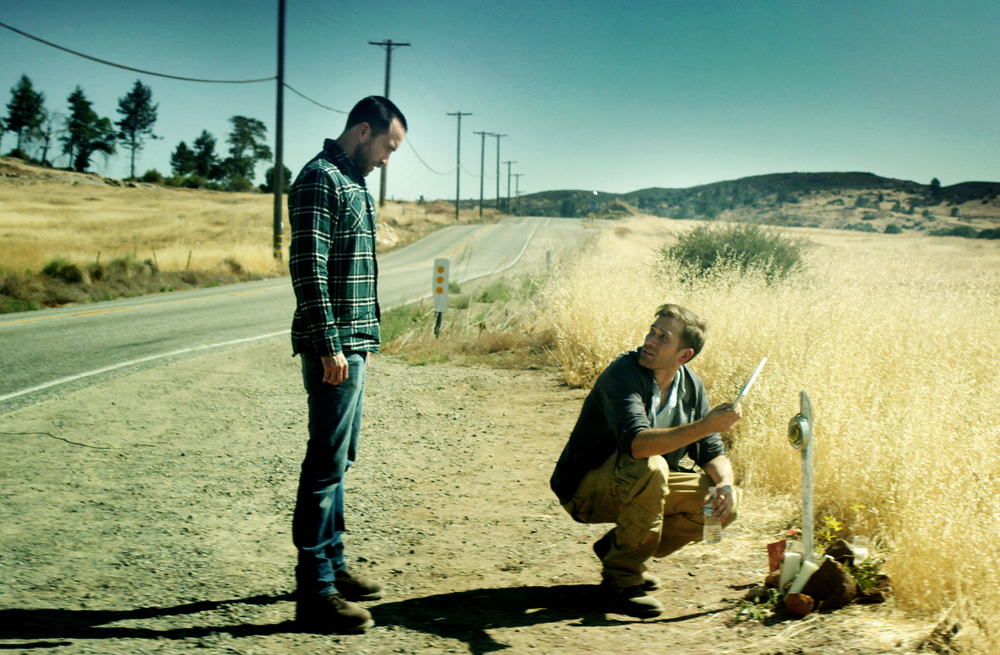At the Tribeca Film Festival, Justin Benson and Aaron Moorhead got a little emotional in introducing the premiere of their latest film “The Endless.” It had been five years since the directing duo first made their names at the festival with “Resolution,” a scrappy thriller centering on a friend’s intervention for his meth-head pal that becomes a tale of survival for them both, and not knowing where the film would take them, Benson was able to now confidently get up and thank his father for letting him skip medical school in favor of filmmaking. In fact, both he and Moorhead took the opportunity to thank five people in their lives since they considered “The Endless” to be about family — Moorhead would credit his mother, a psychologist and a “humanist,” for why the pair never fixates on “cool shots” in favor of capturing the emotion of any given moment, and got to have his brother and sister in the audience for a premiere of one of his films for the first time.
All this warmth might’ve seemed unusual around the midnight hour when Benson and Moorhead’s films typically play at festivals, but it spoke to what makes their work so special since while you’d be right to classify their films as part of the horror genre, that horror generally comes from the idea of knowing a person so well that any surprise in their behavior will feel alien. (Perhaps this in itself is a byproduct of their close collaboration — as their producer David Lawson said, struggling to think of any time the pair has had a disagreement, “They share a brain.”) Their gift for taking what’s in front of you and surprising you with it has enabled them to make films with seemingly opposite impulses, creating intimate character studies of people who find themselves in extraordinary situations. Such is the case with “The Endless,” in which two brothers who escaped a cult when they were kids are lured back after receiving a video tape in the mail that inspires very different reactions from the siblings.
Though you might be inclined to read into the fact that Benson and Moorhead play the brothers, not so coincidentally named Justin and Aaron, as part of the narrative, it was a practical decision that is actually more emblematic of how “The Endless” is the duo’s most ambitious and most personal film to date, based on an idea so crazy they weren’t sure they could get anyone to star in it besides themselves. While the two rise to the challenge, despite having no acting experience of their own, they needn’t have been worried about attracting others, accompanied by rising talents such as “Alien: Covenant”’s Callie Rodriguez and “Quantico” regular Tate Ellington at the cult’s desert compound, and they impress even further by taking one of the grander story ideas they alluded to in “Resolution” and do it justice with the skill and confidence gained in the time between. The result is incredibly rewarding, especially for Benson and Moorhead’s ever-growing legion of fans.
Shortly after the film’s premiere, Benson, Moorhead and Lawson, clearly acknowledged as the third musketeer (who, beyond his work as a producer, steals scenes in “The Endless” as the constantly grinning cult member Smiling Dave), spoke about not playing it safe at a time when their careers are on the rise, how they were able to follow through on something so many established filmmakers dream of in being able to revisit and improve upon their first film, and putting all their skills — filmmaking and otherwise — to use in the highly original drama.

Justin Benson: It’s such a long answer. [laughs] We just went through it. For some reason this little movie, “Resolution,” that very few people saw…there’s absolutely no business reason to try to franchise it or make a sequel, but for some reason inspired us for five years to think about it. Whether it was wondering what Chris and Mike were up to or [the origin of] who’s Shitty Carl?
Aaron Moorhead: Vinny [Curran, who starred in “Resolution”] would text us funny pictures of people being shitty, and he’s like, “Hey, check it out, I found Shitty Carl.” The mythology just lived on, and I don’t mean just the supernatural aspect, but the entire mythology of the movie haunted us for a while, to the point that we decided, “Let’s just go make a movie. Big budget or small, let’s pool our money together.” That’s not what it ended up being, but it could’ve been. With the “Resolution” mythology, Justin was telling me, “I don’t know if that story’s done yet” and now that I say it out loud, that sounds really writer-y, but it was true.
David Lawson: You might say there’s not a resolution. [laughs]
Justin Benson: For some reason, that location, those characters, that world, as they call it, it inspired us to make something that were very careful to make sure that it wasn’t insular, that it wasn’t esoteric, that people didn’t need to see this little tiny movie no one’s heard of to understand it. But that the world inspired us to do our best work.
Aaron Moorhead: I actually love the phrase, “Give yourself permission to do it,” because it was terrifying in the very beginning. Are we just, for lack of a way better word, jerking ourselves off in a way? Or do we think we’re bigger than we are? We know nobody saw “Resolution,” but the idea is haunting and nobody’s doing that mythology, [so we thought] maybe we could just invent our own and keep it going and expand. This isn’t a sequel, but [these films] answer each other’s mysteries, they’re puzzle pieces that fit each other, and you can enjoy them [if you] have no idea the other exists. So the problem when talking about [“The Endless”], which we’re just starting to do today for the first time ever, is that we’re trying to figure it out. If you call it a sequel, that’s dangerous because people are like, “Well, I didn’t see the first film,” and it can hurt the movie because it’s not.
Justin Benson: There’s perfect continuity, and it is serialized, but you just don’t need one for the other.
Aaron Moorhead: What do you think?
I felt that way too, and really, I was sitting there enjoying it for it was, and then when I saw the shack [from “Resolution”], a grin started creeping across my face and by the time there were more specific story allusions to “Resolution,” I lost it.
Aaron Moorhead: By the way, we got to be on that set [again from “Resolution”]. That felt cool as hell.
That did make me wonder whether knowing that location from “Resolution” gave you something physically to build around for this.
Aaron Moorhead: Yeah, absolutely. We try to write – and by write, I mean Justin – everything to a place we know we can shoot. When we’re talking about what we’re gonna do, we try to make sure that already know how to do at least 90% of it. Camp Arcadia, for example, which is the main setting of the film, is where we housed ourselves and our crew for “Resolution,” so we know Camp Arcadia exists – it’s called Camp Oliver in real life, and [we thought] let’s write a whole movie that takes place in Camp Oliver.
David Lawson: All of the scenes were already like, “Oh, we know there’s a big long communal table that we can make we know there’s a fireplace we can go to and there are these little cabins, and this one cabin that’s kind of off [to the side],” so when we did the location scout for “The Endless,” it was really easy because we were intimately familiar with those locations because we lived there for three weeks.
Aaron Moorhead: Before we even started writing.
Justin Benson: Yeah, then after it was written, the location scout took us one day, which is a little bit scary because I was writing from memory of these locations, and five years has gone by, so I was a little bit worried when we scouted [thinking], “Oh man, what if my memory was incorrect” or [because] we have a lake scene, “What if that lake was like, “No, you can’t shoot here.”
Aaron Moorhead: I’ve got a worse one. What if Camp Oliver was like, “Oh no, there’s just a skyscraper here now.” [laughs]
One of my favorite things you do since your very first film is this idea of turning the natural into unnatural in simple terms where you just accept it as soon as it happens. There’s no elaborate explanation. When someone mentions that everyone at the commune is far older than they appear, you just accept it as fact since all the markers were in place beforehand. Likely at the start of your careers that was a function of budget, but now is that a function of personal taste?
Aaron Moorhead: If you had to give it a genre, this would probably be a mystery or something like that, and there’s a million little pieces going on, and that line’s of them – why does everyone look so young? There’s only one or two times it’s ever mentioned, and you have to keep that piece juggled in your mind as all the other threads come together, [which is] hopefully a sign of a good mystery, [where you’re] like, “Ohhh, that’s right,” especially when on second viewing. That [detail] was actually where we were a little worried. Are people just gonna know exactly what’s going on as soon as he says that line? If Tate [Ellington], who plays Hal, doesn’t have like a little gray streaks in his hair, which he doesn’t [in real life], by the way – he’s like the youngest looking dude in the world, but are they just going to know what the [bigger] mystery is? Will we just give our hand away?
It’s so weird because as the storytellers, the hand has already been shown to you because you invented the hand, so you’re always thinking you’re giving away your hand. And then you’re getting in cut screenings and in setting up the script, you’re getting feedback of, “What the hell’s going on?” So we’re like, “Oh, we need to hammer it.”
David Lawson: We made it very specific, in the script and [during the] notes phase, to give it to both people who had seen and loved “Resolution,” and people that had never heard or seen the movie at all because that really informed us on how heavy we had to get with the explanation.
Justin Benson: Actually, near the end of our script notes process, we probably had the weirdest note sessions in the world for these poor readers. We sent [the script] out to some friends and were like, we need 10 people who have never heard of [“Resolution”], never heard of our names, and maybe aren’t even in the film industry, to read the script and then give us a call, just to make sure that we weren’t making a sequel and to make sure it fit for everybody [watching it]. [So we asked them] to explained in as much detail what just happened in the plot as if you’re [reading] the script to me to make sure it made sense to other people, and then we’d be like, “Thank you,” and that was it. It was probably the weirdest thing, like okay, but we just needed to make sure that it made sense to everybody, and that it made sense period. I’m not proud of that note process, but I’m really glad we did it.
Aaron told a funny anecdote at the premiere about having the crew move the monitor to watch himself during the performance because the sun was getting in his eyes and he was also acting as cinematographer. How did you develop this for yourself to star in, logistically or otherwise?
Justin Benson: Not every part, but Aaron and I’s parts – and definitely Dave’s part – were all written with [the idea of], “Look, we’re all gonna be there, and we’re making this movie and we’re going to perform in it. We’re committing to that” so it was about making sure that it wasn’t overly ambitious for us to lead the movie, and pull it off emotionally. So I would be writing it and I’d email Aaron and be like, “Hey man, what kind of [fishing] knots can you tie? Give me your skills. What can you do?”
Aaron Moorhead: He literally asked me for a list of my skills. [laughs] There’s a scene that was cut that [came from one of those e-mails that started] “Hey, I just remembered…” It was a separate text a few days later, [where] I was like, “I just remembered, I know how to gut a fish.” So there was a scene of me gutting a fish.
David Lawson: [Justin] asked me the same question and that’s why all I’m doing is smiling. [laughs] That’s my whole [ability].
Justin Benson: Dave actually has the best one, because I was sitting in my kitchen writing the script, trying to synthesize Aaron’s skillset and what I think I can do – I was willing to shave my head. That’d be a funny joke. I can swim, I’ll jump in a lake. But as I was writing Dave’s character, he was on set of “68 Kill,” an awesome movie that he produced [by Trent Haaga that recently premiered at SXSW], and I was like, “How was your day?” And he just sent me this photograph of him having to remove this 400-lb. rotting dead boar, with this huge creepy fake smile. It was in that moment Smiling Dave [was born]. [laughs] And it’s crazy because everyone loves Smiling Dave.
David Lawson: I hated it. [laughs] I hated every minute of being on camera. Because we have a nice working relationship, and I like to be forward-thinking, I allow them to operate in the now and I’ll do whatever I need to do to make sure that we keep our day going and hitting our schedule. Because it’s an indie film, we don’t have a studio to just go to and be like, “Hey, we need another five hundred thousand dollars,” and they’re like, “Okay, here’s your check.” No, this is what we have and it made me have to be more in the now.
Aaron Moorhead: I want to just set a scene for you. Its day 14 or 15, which doesn’t sound like much, but when you’re going on no sleep and you’re a multi-hyphenate, it’s everything on a 17-day shoot, and it’s 4:30 in the morning. The sun’s about to come up and we need the camera to roll and it’s a two-shot of us, it’s scene where we’re [at] the viewing ceremony, where we watch the tape, and the two of us are in the foreground trying to look scared, and [Dave is] in the background. [Justin and I have] been trading who calls “Action!” and it’s just so late and everyone’s so tired. The camera starts rolling and we don’t know when to turn towards the TV, and everyone’s just silent trying to figure out, “When do we go [to start the scene],” and you see Smiling Dave [in the background] and [we called] action. [laughs] And we’re all just like, “Thank you Dave.”
Justin Benson: The assembly cut of the movie had more Smiling Dave in it, and Dave’s performance is so powerful we literally had to trim some of Smiling Dave out because people saw the first cut and they’re like, “So Smiling Dave’s behind all of it? He’s manipulating everything?”
Aaron Moorhead: Smiling Dave was the genius behind all of it. [laughs]
David Lawson: I was too good. [smiling]
“The Endless” will open on April 6th in New York at the IFC Center and April 13th in Los Angeles at the Monica Film Center. A full schedule of theaters and dates is here.




